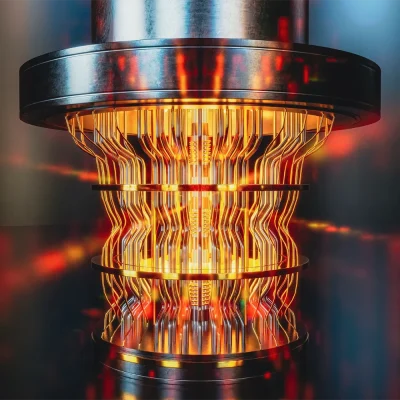The microchips that we have in our laptops and mobile phones use bits (which can be either 0 or 1 – this is called binary).
Quantum computing is based on the principles of quantum mechanics, the science of tiny atoms and particles. Quantum computers utilise qubits, which can exist in multiple states at once due to superposition. For example, they can be either 0 or 1, or both 0 and 1 at the same time. An analogy of this is a spinning coin – it is both heads and tails until it stops spinning and the side facing up can be viewed. When a qubit is measured, it “collapses” into a definite state – either a 0 or a 1.
Quantum computing also allows for instant communication between qubits. They can also be linked meaning the state of one qubit impacts another, even if they aren’t close together. This process is called entanglement.
Logic gates exist in standard computing by using binary inputs to make computations and data processing. With superposition and entanglement, Quantum gates can handle more complex operations than standard logic gates.
Quantum computing remains a worldwide research project. Some of the biggest technology companies, including Google, Amazon, IBM & Microsoft, have all been trying to advance the state of quantum computing.
Google has announced the 105-qubit Willow chip – this supports more qubits and improved error correction. The current error rates of quantum computing are one of the primary factors limiting this new technology to the experimental stage. Quantum circuits are also vulnerable to changes in temperature, electromagnetic radiation and vibrations.
Currently there are few commercial applications for this new technology, but this will change over the next few years. Willow has been claimed to solve a mathematical problem called random circuit sampling. Willow completed a task in 5 minutes while a massive (standard) supercomputer would have theoretically taken 10 septillion years (1 followed by 25 zeros).
Over the next few years we will need more computing power to help in drug development, enhancing data encryption or to solve complex logic problems, but this doesn’t necessarily mean that there will be quantum chips in our laptops anytime soon.



